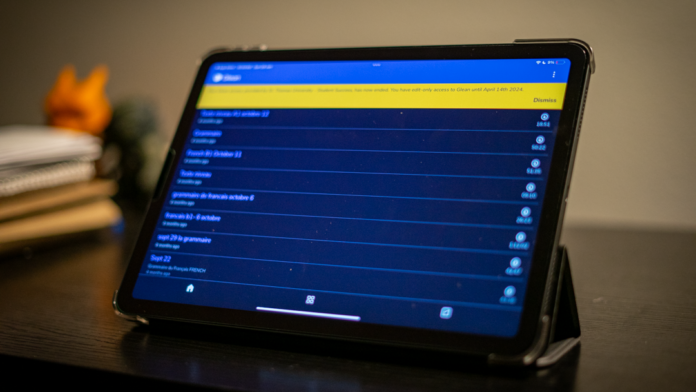
St. Thomas University has transitioned from student note-takers to the AI service Glean, an app to help transcribe lectures and highlight the key takeaways.
The transition from human note-takers to Glean started earlier in the academic year to alleviate costs and save time, said Student Accessibility Services manager, Lean Hutchins. Before, the Accessibility office would look for students in classes that required note-takers and pay them $125 at the end of the semester.
Emmanuelle Jackson, a third-year sociology and fine arts student, said they find Glean less accessible than note-takers.
“I preferred having just the notes written in front of me so I could see how organized everything was, but at the same time Glean does work quite well,” said Jackson who has been using note-takers since 2021.
Jackson has a condition that makes it hard to physically write and Glean has offered her the opportunity to not focus on taking notes.
“I’m not able to write my notes. Having the audio transcription helps because then I can see exactly what the professor said,” they said.
Jackson believes the app could be improved.
“Sometimes the audio transcription doesn’t work very well and there is live captioning on the app, but it doesn’t work that well either.”
Overall, Jackson said that even though the app has its problems, it has improved their way of learning.
“I’d say it’s made it easier for me to focus because now instead of focusing on how much my hand might hurt, I can kind of sit back and just listen to the professor.”
Hutchins said the office is now offering training to use Glean, which was not available last semester.
“We’re just encouraging them to come in and try training with us, so they can give it a fair shot before switching to something else,” said Hutchins.
However, Hutchins admitted there are limitations with the app, such as poor transcription. Furthermore, the software needs the student to be able to attend the class in order to get the notes taken, which can be a challenge for some people with health conditions.
“A lot of our students have the accommodation of occasional absences based on their disability. Some are having periods where they’re not able to get to class.” she said. “In those instances, if that’s a common occurrence for students, we kind of go the other route where we find them an actual note-taker,” said Hutchins.
Furthermore, Glean is an English-only app, so students taking classes in different languages might not find it useful at all.
Hutchins said the use of Glean has caused a lot of controversy among the professors who do not want technology in their classrooms. It has become a “contentious issue.”
“Oh, there’s so much,” said Hutchins after being asked if there were issues with AI among professors. “Our office then has to advocate for the use of the technology because they do have a duty to accommodate.”
